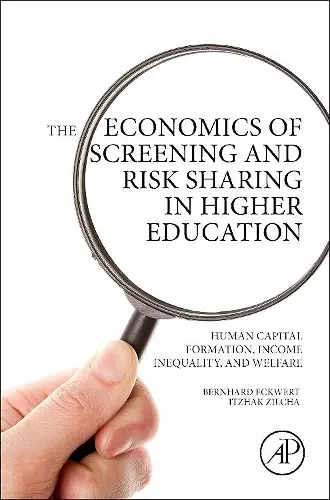The Economics of Screening and Risk Sharing in Higher Education
Human Capital Formation, Income Inequality, and Welfare
Bernhard Eckwert author Itzhak Zilcha author
Format:Paperback
Publisher:Elsevier Science Publishing Co Inc
Published:22nd Apr '15
Currently unavailable, and unfortunately no date known when it will be back

Tools from the economics of uncertainty, risk, and information illuminate the problems of screening students for entrance to universities, with innovative and novel results
The Economics of Screening and Risk Sharing in Higher Education explores advances in information technologies and in statistical and social sciences that have significantly improved the reliability of techniques for screening large populations. These advances are important for higher education worldwide because they affect many of the mechanisms commonly used for rationing the available supply of educational services. Using a single framework to study several independent questions, the authors provide a comprehensive theory in an empirically-driven field. Their answers to questions about funding structures for investments in higher education, students’ attitudes towards risk, and the availability of arrangements for sharing individual talent risks are important for understanding the theoretical underpinnings of information and uncertainty on human capital formation.
"...the relevance of the book’s theme and the clear presentation makes this work a highly valuable reading for all scholars of the economics of education." --Journal of Economics "Recent economic conditions and predictions have increased interest in the analysis of higher education finance, provision, and allocation. This timely book presents a rigorous theoretical analysis tackling two key issues, and is a valuable resource for both experienced and aspiring researchers." –Sinan Sarpça, Koç University "This book offers a unique comprehensive analysis of the use of screening techniques for admission to higher education. It develops rigorous theoretical insights to address a highly relevant issue in policy which carries huge potential implications for human capital accumulation, the allocation of talents, and income inequality." – Graziella Bertocchi, Università di Modena e Reggio Emilia "This is a beautiful work, a pleasure to read. With MOOCs, reduced government support, and worsening income distribution, concern about how students are sorted among institutions of higher education is rising. To address the effect of universities' ability to process more information about students, Eckwert and Zilcha devise a general equilibrium sorting model , more technically sophisticated than the usual partial equilibrium approach but also more relevant for policy. There are analogies between what they do for higher education and what others have done to model health insurance, where welfare can also be reduced by improved information." – David Denslow, University of Florida "Reading this book will be a pleasure for everyone who is interested in education and in the same time familiar with the economics of information and general equilibrium theory. The models are designed parsimoniously, but rich enough to make the point, and the exposition is perfectly rigorous and clear. In most cases, the authors also give a crisp intuition for the effects driving the results…the book contains important lessons for empirical research and policy. Its findings actually underline the value of general equilibrium theory for education economics by pointing out trade-offs and market repercussions which are seldom appreciated…the relevance of the book’s theme and the clear presentation makes this work a highly valuable reading for all scholars of the economics of education." – The Journal of Economics
ISBN: 9780128031902
Dimensions: unknown
Weight: 250g
190 pages